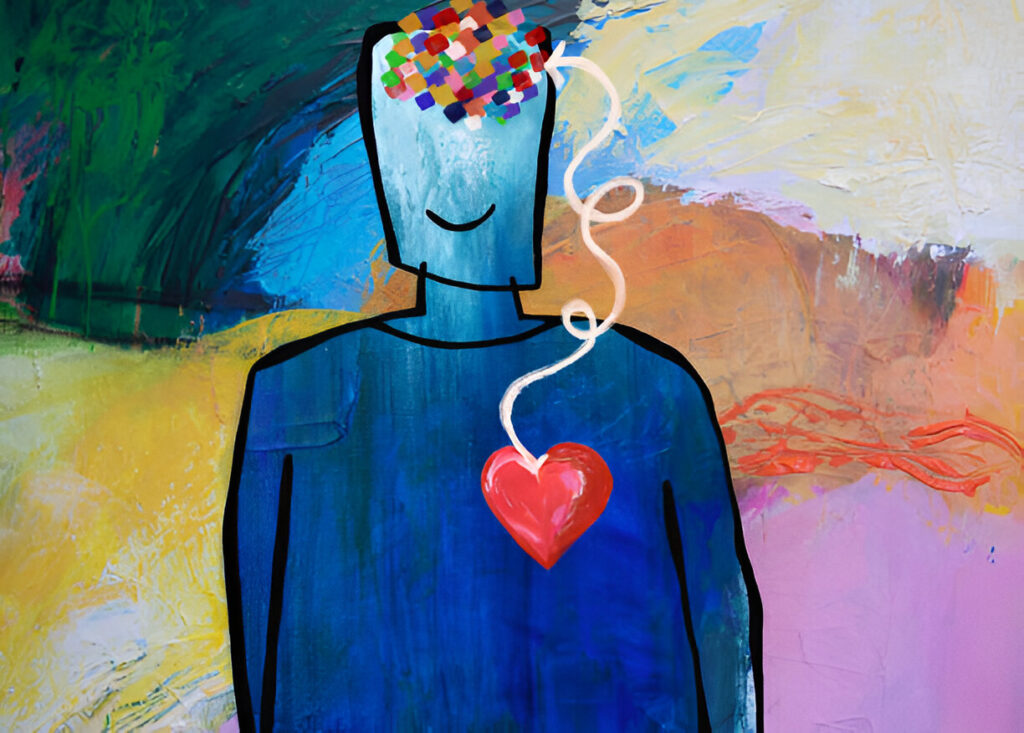Why Emotional Health Matters
In today’s fast-paced world, emotional health is often overlooked, despite its profound impact on every aspect of our lives. Our emotions shape how we perceive the world, interact with others, and even make decisions.
Emotional health isn’t just about feeling happy or avoiding sadness; it’s about maintaining balance and resilience, regardless of external circumstances.
When our emotional health is strong, we are more equipped to handle stress, build meaningful relationships, and lead fulfilling lives. However, many of us struggle with emotional challenges like anxiety, anger, or sadness, and these can negatively affect our overall well-being.

This is where building healthy emotional habits can be transformative. By incorporating simple but powerful habits into our daily routines, we can cultivate emotional health that enhances our quality of life.
In this article, we will explore six essential habits that will improve your emotional health and help you navigate life’s challenges with greater ease.
1. Practice Mindfulness and Meditation
What is mindfulness?
Mindfulness is the practice of being fully present and aware in the current moment, without judgment or distraction. It involves observing your thoughts, emotions, sensations, and surroundings with a sense of openness and acceptance, without becoming overwhelmed or reactive.
Essentially, mindfulness is about stepping out of automatic, habitual thought patterns and intentionally focusing on the present.
It’s not about achieving a state of “empty mind” or trying to force yourself to think or feel a certain way. Rather, it’s about cultivating awareness and acceptance of your internal and external experience as it unfolds.
Mindfulness originated from ancient Buddhist teachings but has become widely popular in Western practices due to its profound benefits for mental and emotional well-being.
The goal of mindfulness is not to eliminate negative emotions or thoughts, but to change the way we interact with them. Instead of reacting impulsively, we learn to notice our emotions without judgment, creating a space for reflection and choice in how we respond.
Why It’s Important for Emotional Health
- Mindfulness plays a critical role in emotional health because it enables us to observe and engage with our emotions in a way that is less reactive and more constructive.
- By paying close attention to our thoughts and feelings in the present moment, we can reduce the influence of past experiences or future worries on our current emotional state.
- This awareness allows us to respond to difficult emotions with greater control, preventing us from becoming overwhelmed or consumed by them.
- Research consistently shows that mindfulness can significantly improve emotional regulation. For example, studies have found that mindfulness practices can decrease emotional reactivity and help people manage stress more effectively.
- It allows us to interrupt negative thought patterns that can lead to emotional outbursts or rumination. By simply noticing our emotions and thoughts without judgment, we create space to make conscious, thoughtful choices about how to respond.
- Mindfulness also enhances empathy and compassion, both for ourselves and others. When we practice mindfulness, we become more attuned to our own emotional states and, as a result, develop a greater understanding of the emotions and experiences of those around us.
- This heightened emotional awareness fosters healthier relationships and improves communication, which in turn has a positive impact on our overall emotional health.
- Moreover, mindfulness is associated with a reduction in symptoms of various mental health challenges, such as anxiety, depression, and chronic stress. By calming the mind and focusing on the present, mindfulness helps break the cycle of excessive worry or negative thinking that can fuel these conditions.
How to Start Practicing Mindfulness
Mindfulness is a simple but powerful practice, and anyone can start integrating it into their daily routine, even if they have never meditated before. The key is consistency and starting small. Here are a few accessible ways to begin practicing mindfulness that can be seamlessly woven into your everyday life:
Breathing Exercises
One of the easiest ways to practice mindfulness is by focusing on your breath. Deep breathing exercises can help calm the nervous system and bring you back to the present moment. To get started, sit comfortably in a quiet space where you won’t be distracted.
Close your eyes if you feel comfortable doing so and take a few deep breaths in through your nose. As you inhale, focus on the sensation of the air entering your body, filling your lungs. As you exhale, notice the release of the air from your body.
The goal here is to focus entirely on your breath, how it feels, how it moves in and out of your body. If your mind begins to wander, gently bring your attention back to your breath without judgment. You can practice this for just 3-5 minutes at first, gradually working your way up to longer sessions.
Body Scan
A body scan is a form of mindfulness that involves systematically bringing your attention to different parts of your body to notice any sensations or tension. Start by lying down or sitting in a relaxed position.
Begin with your feet and slowly move your attention upward, pausing at each body part along the way: your ankles, knees, thighs, abdomen, chest, arms, neck, and finally your head. As you focus on each area, notice how it feels.
Is there any tension? Discomfort? Warmth? Is there an absence of sensation? The goal is to bring awareness to the present state of your body without trying to change or fix anything. If your mind drifts, gently redirect your attention to the body part you were focusing on.
This practice not only helps develop mindfulness, but it also increases your awareness of physical tension that might be connected to emotional stress.

Mindful Walking
Mindful walking is another simple yet effective way to practice mindfulness while getting some physical exercise. The beauty of mindful walking is that it can be done almost anywhere, whether you’re in a park, walking to work, or just moving around your house.
To practice mindful walking, take slow, deliberate steps and pay attention to the sensations in your body as you walk. Feel the ground beneath your feet, the movement of your legs, and the shifting of your weight with each step.
You can also incorporate your surroundings into your mindfulness practice. Notice the sounds around you, the colors, the temperature of the air, and the textures you encounter. The key is to stay present and focus on your bodily sensations and environment rather than getting lost in your thoughts.
Mindful Eating
One of the most accessible ways to practice mindfulness is during meals. Mindful eating involves slowing down and truly experiencing your food—its colors, textures, smells, and flavors. Instead of rushing through your meal or eating while distracted, take the time to savor each bite.
Pay attention to the sensations in your mouth and how your body responds to the food. Notice the feeling of hunger or fullness as you eat. This practice not only cultivates mindfulness, but it also helps prevent overeating and promotes better digestion.
Mindful Listening
Mindful listening is a practice that can enhance communication and emotional connection with others. When engaging in a conversation, try to be fully present with the person you’re speaking to, listening attentively without interrupting or thinking about your response.
Notice the tone of their voice, the words they choose, and the emotions behind their message. This practice fosters empathy and can improve the quality of your relationships, as it helps you tune in to others’ feelings and needs.
How to Make Mindfulness a Daily Habit
While mindfulness may seem difficult at first, it is a skill that can be developed with practice. One of the most important aspects of building a mindfulness practice is consistency. Start by setting aside a few minutes each day whether in the morning, during lunch, or before bed—to engage in mindfulness.
As you begin to notice the benefits, you may find yourself naturally incorporating mindfulness into more aspects of your life, whether while driving, taking a shower, or even doing household chores.
Additionally, try using reminders to help you stay consistent. You can set an alarm on your phone or write a note to yourself that reminds you to take a mindful moment during the day. With time, these small practices can accumulate into a profound shift in your emotional well-being.
Mindfulness as a Tool for Emotional Growth
The beauty of mindfulness is that it offers a safe space for emotional growth. By practicing mindfulness, we not only learn how to manage and regulate our emotions more effectively, but we also become more aware of our emotional triggers and patterns.
We begin to recognize when we’re caught in negative thinking spirals, and through mindfulness, we can pause, breathe, and choose a different response.
This ability to observe our emotions without being overtaken by them allows for emotional growth. It helps us develop emotional intelligence, our capacity to understand and manage our emotions and those of others.
Over time, mindfulness can transform how we relate to ourselves, our emotions, and the world around us, leading to a deeper sense of emotional balance, peace, and resilience.
By integrating mindfulness into your daily routine, you’re not only promoting emotional health but also fostering a sense of inner peace and self-awareness that can enhance every area of your life.
Whether you’re seeking to manage stress, improve relationships, or simply feel more grounded, mindfulness can be a powerful tool for creating lasting emotional well-being. The more you practice, the more naturally these habits will take root, helping you to live a more intentional, emotionally balanced life.
2. Develop Emotional Awareness
What is emotional awareness?
Emotional awareness is the ability to recognize and understand your emotions as they arise. It’s an essential skill for emotional health because it helps you manage your feelings, rather than letting them control you.
Why It’s Important for Emotional Health
Emotional awareness creates a strong connection between the mind and body, making it easier to recognize when you are feeling stressed, anxious, or overwhelmed. By understanding the triggers behind your emotions.
you can respond more consciously, rather than reacting impulsively. When you’re emotionally aware, you are less likely to suppress emotions, which can lead to physical and mental health issues.

How to Build Emotional Awareness
Building emotional awareness involves:
- Journaling: Regularly writing about your emotions helps you explore your thoughts in depth and develop a greater understanding of what’s going on inside. Ask yourself, “How do I feel right now, and why?”
- Check-In with Yourself: Take a moment throughout your day to pause and assess how you’re feeling. Are you tense? Happy? Anxious? Labeling your emotions allows you to address them.
- Identify Triggers: Pay attention to the situations that lead to intense emotional reactions. Understanding what sets you off can help you manage your emotions more effectively in the future.
3. Cultivate Gratitude
What is gratitude?
Gratitude involves acknowledging and appreciating the positive aspects of your life, no matter how small. It’s the practice of recognizing what you have, rather than focusing on what you lack.
Why It’s Important for Emotional Health
Gratitude has been shown to increase happiness, reduce stress, and improve emotional well-being. When you focus on the positive, you create a buffer against negative emotions like frustration, sadness, and envy. Practicing gratitude can rewire your brain to recognize and appreciate the good, helping you maintain a more positive mindset, even in difficult times.
How to Cultivate Gratitude
- Gratitude Journaling: Each day, write down three things you are grateful for. They can be as simple as a good cup of coffee or as profound as a loving relationship.
- Gratitude Jar: Keep a jar where you add notes of gratitude throughout the year. At the end of the year, read through the notes and reflect on the positive moments of your life.
- Express Gratitude: Take time to verbally express gratitude to others. Whether it’s a thank-you note, a text message, or a simple “thank you” to someone who has helped you, expressing your appreciation strengthens connections and nurtures positive emotions.
4. Foster Healthy Relationships
What Are Healthy Relationships?
Healthy relationships are built on mutual respect, trust, and open communication. These relationships foster emotional support, provide a sense of belonging, and encourage personal growth.
Why They’re Important for Emotional Health
Strong relationships are one of the most significant contributors to emotional health. They provide a safe space to express feelings, share experiences, and receive empathy. Having a support system can buffer the effects of stress and help you navigate life’s challenges with greater resilience.
How to Foster Healthy Relationships
- Invest in Communication: Open, honest communication is key to any strong relationship. Practice active listening, where you focus on what the other person is saying without interrupting.
- Set Boundaries: Healthy relationships require respect for personal boundaries. Learn to say no when needed and prioritize self-care.
- Spend Quality Time Together: Focus on nurturing relationships by spending quality time with loved ones. Whether it’s a weekly dinner or a phone call, staying connected strengthens bonds.

5. Prioritize Self-Care
What is self-care?
Self-care involves taking deliberate actions to maintain your physical, mental, and emotional well-being. It includes activities that help you recharge, reduce stress, and promote overall health.
Why It’s Important for Emotional Health
When we neglect self-care, our emotional health can suffer. Taking time for self-care helps replenish our energy, manage stress, and improve mood. It also encourages a positive self-image, as we show ourselves the love and care we deserve.
How to Prioritize Self-Care
- Exercise: Regular physical activity releases endorphins, which are natural mood boosters. Aim for at least 30 minutes of exercise most days of the week.
- Sleep: Ensure you get enough restful sleep. Lack of sleep can lead to irritability, poor emotional regulation, and increased stress.
- Hobbies and Fun: Make time for activities that bring you joy and relaxation, whether it’s painting, reading, or spending time in nature.
6. Practice Acceptance
What is acceptance?
Acceptance is the practice of embracing life as it is, without trying to change, judge, or resist it. It involves acknowledging our current emotional state, experiences, or circumstances, even when they don’t align with what we desire or expect.
Acceptance is not about passively tolerating difficult emotions or situations; it’s about recognizing them for what they are, allowing them to exist without the additional burden of judgment or resistance.
In life, things rarely unfold exactly as we imagine. Relationships might not always go smoothly, our careers may hit unexpected setbacks, and our emotions can fluctuate unpredictably. Acceptance, in this sense, is a mindset that empowers us to find peace with what is without the need for everything to be perfect.
This concept is rooted in mindfulness and self-compassion, both of which encourage a non-judgmental stance toward ourselves and the world around us. It’s about acknowledging that life has its ups and downs and that we can remain grounded and emotionally balanced, even in the face of adversity.

Why It’s Important for Emotional Health
When we resist difficult emotions or situations, we create additional stress and emotional turmoil. Resistance often intensifies negative feelings and keeps us stuck in unhealthy thought patterns.
For example, when we feel angry or sad and then judge ourselves for having those feelings, we add layers of guilt, shame, or frustration. This creates an emotional feedback loop, which can make the experience of negative emotions feel even more overwhelming.
Acceptance, on the other hand, allows us to let go of the internal struggle and make room for emotional healing. When we accept difficult emotions without judgment, they lose their power over us.
We no longer feel compelled to avoid or suppress them, which can lead to healthier emotional responses and a more balanced mindset. This doesn’t mean we like what’s happening, but rather that we are willing to acknowledge and sit with it, rather than running from it.
Furthermore, acceptance fosters resilience. Acceptance allows us to navigate challenges with greater ease and less emotional turbulence, even when life doesn’t always unfold according to plan.
By engaging in acceptance practices, we strengthen our emotional resilience, recognizing our ability to navigate life’s unpredictable turbulence without succumbing to despair or excessive stress.
Embracing acceptance can also help us manage negative self-talk. Many people struggle with perfectionism or hold themselves to impossibly high standards. They might feel that they must be constantly “in control” or that things should always go according to their expectations.
This can create frustration when things go wrong. Acceptance facilitates the release of control and fosters self-compassion. It teaches us that we are okay, just as we are, flaws and all.
How to Practice Acceptance
Learning to practice acceptance is a skill that takes time and patience, but it can be incredibly transformative. Below are some practical ways to integrate acceptance into your emotional health journey:
Mindful Acceptance
Mindful acceptance involves becoming aware of your emotions as they arise, without judgment or resistance. For example, when you feel anxiety or sadness, rather than trying to suppress these feelings or deny them, simply acknowledge them.
Notice where you feel these emotions in your body. Are your shoulders tense? Does your stomach feel tight? Rather than trying to immediately change how you feel, practice sitting with the emotion for a moment. Observe it, and accept that it’s a natural part of being human.
This practice can be especially helpful when emotions feel overwhelming. By simply acknowledging them and allowing them to exist without trying to immediately alter them, you create space to understand them.
Over time, you’ll become more comfortable with difficult emotions and less likely to react impulsively or avoid them altogether.
Letting Go of Control
Another key aspect of acceptance is letting go of the need to control every aspect of life. This can be a tough habit to break, especially for perfectionists or those who thrive on planning and organization.
Life is unpredictable, and trying to control every outcome can lead to constant frustration and burnout. Instead, acceptance encourages us to acknowledge what we can and cannot control.
When we focus on what is within our control, such as our reactions, our mindset, or the way we handle difficult situations, we free ourselves from the pressure of trying to micromanage every aspect of our lives.
Letting go of the need for perfection allows us to embrace life’s unpredictability, which in turn fosters a sense of peace and emotional freedom.
For example, instead of stressing over external circumstances you can’t change (like someone else’s behavior or a work situation), accept that you have no power over those things.
Instead, focus on how you choose to respond. Are you going to react with anger or frustration? Or are you going to respond calmly and move forward?
Forgiveness
Forgiveness is a powerful practice of acceptance that can bring deep emotional healing. Holding onto grudges or anger toward others (or even yourself) prevents emotional growth and peace.
While forgiveness doesn’t mean excusing someone’s behavior, it does mean releasing the emotional burden of carrying resentment. By forgiving, you liberate yourself from the hold of negative emotions and pave the way for healing.
Start by acknowledging any grudges or resentment you might be holding. Recognize how these feelings affect your emotional health.
Do they create stress, anxiety, or bitterness? By practicing acceptance, you can come to terms with these feelings and make a conscious choice to forgive, not for the benefit of the person who wronged you, but for your own well-being.
Self-forgiveness is equally important. Let go of past mistakes, accept your imperfections, and understand that you are deserving of compassion, just as you would offer to others.

Acceptance of Imperfection
Part of practicing acceptance is acknowledging that life and ourselves are inherently imperfect. Often, we hold ourselves to unrealistic standards or expect life to follow a perfect script. However, embracing imperfection helps us become more flexible, compassionate, and realistic in our expectations.
Instead of fixating on mistakes, flaws, or unmet expectations, practice self-compassion and remind yourself that imperfection is part of the human experience.
When you embrace imperfections, whether in yourself, your relationships, or life circumstances, you create space for growth, learning, and emotional freedom. This mindset shift helps you let go of constant striving and invites you to focus on what’s working in your life.
Radical Acceptance
Radical acceptance is a form of acceptance that involves fully embracing situations or emotions—even when they are painful or difficult to accept. It means acknowledging that certain things in life cannot be changed, and instead of fighting against them, we learn to accept them as they are.
For example, if you’re facing a chronic illness or loss, practicing radical acceptance means acknowledging the reality of the situation without constantly fighting against it.
This doesn’t mean you’re giving up or resigning yourself to the pain, but rather, it means recognizing what you cannot change and finding ways to navigate life with a sense of peace and acceptance.
Radical acceptance can be challenging, but it’s often a crucial step in emotional healing. When we stop resisting what is, we can focus on what is within our power to change or influence.
Embracing Life’s Flow with Acceptance
Practicing acceptance is an essential tool for fostering emotional well-being. We liberate ourselves from unnecessary stress, frustration, and emotional turmoil when we cease resisting the natural course of life.
Acceptance doesn’t mean we condone everything that happens to us; rather, it means we acknowledge and find peace with the reality of our experiences.
By embracing mindful acceptance, letting go of control, practicing forgiveness, and accepting imperfections, we create a foundation for emotional health that allows us to navigate challenges with resilience and grace.
By doing so, we pave the way for greater peace, balance, and emotional freedom. Acceptance, though challenging at times, is ultimately the path to emotional healing and growth, empowering us to move forward in life with a deeper sense of inner peace and emotional strength.
FAQ
Q: How long does it take to see improvements in emotional health?
A: The time it takes varies for everyone, but with consistent practice, you may begin to notice changes in as little as a few weeks. Building emotional health is a lifelong process that improves with time and dedication.
Q: Can practicing mindfulness help with emotional regulation?
A: Yes! Mindfulness is a powerful tool for emotional regulation. By becoming more aware of your emotions, you can respond more thoughtfully, rather than reacting impulsively.
Q: How can I stay motivated to develop these habits?
A: Start small and be consistent. Celebrate small wins, and remember that emotional health is a journey, not a destination. Stay focused on the long-term benefits.
Why is emotional health important
Being emotionally healthy is vital as it helps us think, feel, and act positively. It allows us to deal with life’s struggles, form good relationships, and make choices.
This positively affects physical health, lowers stress, and increases well-being. Maintaining emotional health helps to maximize performance in our work life without overwhelming our personal lives.
Conclusion
By adopting these six habits mindfulness, emotional awareness, gratitude, healthy relationships, self-care, and acceptance you can significantly improve your emotional health. These habits not only help you navigate life’s ups and downs but also empower you to
<script type="application/ld+json">
{
"@context": "https://schema.org",
"@type": "Article",
"mainEntityOfPage": {
"@type": "WebPage",
"@id": "https://skyhealthnews.com/emotional-health/"
},
"headline": "Emotional Health 6 Emerging Habits That Will Restore Your Life",
"description": "Emotional health is often overlooked, despite its profound impact on every aspect of our lives.",
"image": "https://skyhealthnews.com/wp-content/uploads/2025/02/Emotional-health-2-1024x683.jpg",
"author": {
"@type": "Person",
"name": "Farhad",
"url": "https://skyhealthnews.com/"
},
"publisher": {
"@type": "Organization",
"name": "",
"logo": {
"@type": "ImageObject",
"url": ""
}
},
"datePublished": "2025-02-02"
}
</script>









